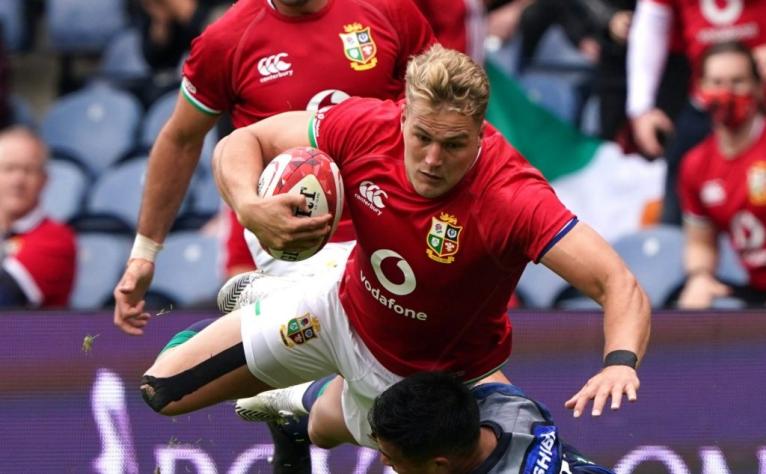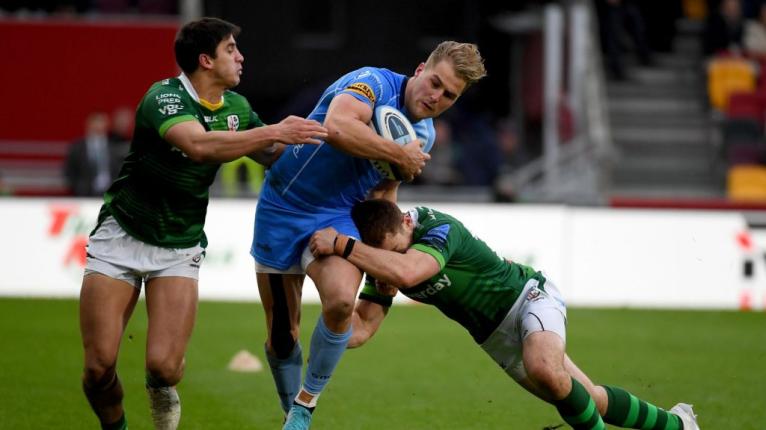“The winger, Van der Merwe, he’ll surprise a few people.”
This would be a prophetic remark from Richard Cockerill, during one of those phoneline fishing expeditions when a journalist tries to cosy up to the incoming coach in the hope of snagging a few stories. Nobody besides Cockerill was talking about Duhan van der Merwe back then, in the summer of 2017, as he moved to reinvigorate a toiling Edinburgh squad and took a punt on the hulking South African.
The wing was a little-known 21-year-old arriving from Pretoria by way of an unremarkable season at Montpellier. He failed his medical, underwent hip surgery, and waited five months for a debut. He later admitted he didn’t know where Edinburgh was – much less that it had a professional rugby team – until a contract offer landed in his inbox.
Six years on, Van der Merwe is one of the greatest attacking threats in world rugby, an irresistible cocktail of brawn, speed and guile. He has 16 tries in 25 Scotland Tests; the latest two, at Twickenham, will be replayed, relived and revelled in for decades to come. The first, a slaloming, breathtaking 60m screamer, a raft of flummoxed Englishmen flailing in his wake. The second, carrying foes over the whitewash to cap a fabulously constructed team try in the dying embers. He has beaten a championship-best 20 defenders from 18 carries in the opening two rounds of the Six Nations, and sits second for ground gained with over 250m. He routinely topped attacking metrics in the Premiership and the URC. These are frightening numbers.
I don’t think there’s anyone in world rugby who can do what he does. If they picked a World XV now, I’d like to know which wing they’re going to pick ahead of him.
Alan Solomons, former Worcester DoR
Alan Solomons has spent some 50 years coaching all over the world and yet he can’t think of a better solo score than Van der Merwe’s one-man sacking of Twickenham. Solomons leapt at the chance to bring the game-breaker from Edinburgh to Worcester in 2021.
“The first try against England was the best individual try I’ve seen in Test rugby,” he says. “It was incredible. His second try, not every wing scores that. Only he could. The minute he got that ball, it was a try. They were never going to stop him. His ability to finish, I don’t think there’s anyone in world rugby who can do what he does.

“If they picked a World XV now, I’d like to know which wing they’re going to pick ahead of him. He can change a game. He can win a game for you, literally. He’s got everything. And he’s still relatively young at 27. Anyone who plays against him is worried about him… they’re worried about him.”
When you talk to people about Van der Merwe, a theme soon emerges. The physical attributes are blindingly obvious. They always were. What Van der Merwe had to nurture, though, as a pup with virtually no professional experience and several serious injuries, was the game intelligence to make him a Test giant. These deficiencies, he attacked.
Solomons says he “worked like crazy, in his own time” fielding high balls until a relative weakness became a strength. His positional awareness grew keener. And his offloading game has improved, culminating in the beautiful one-hander he lobbed inside to send Blair Kinghorn cantering home against Wales a fortnight ago. Precious tools have been added to an already formidable arsenal.
He’s so lethal with a ball-carry that most of the time you just want to say, ‘look, don’t even think about passing, the likelihood is in open space you’re going to score’.
Mike Blair, Edinburgh coach
“When I saw him at first, he was very much injured,” says Cornell du Preez, a senior player at Edinburgh when Van der Merwe arrived, who became a close confidant. “What surprised me is how much better he’s got. He’s worked on a lot of things. I know he didn’t enjoy receiving high balls so he worked on that. Now it’s one of his top points. Defensively, he makes good reads. He’s not just a guy who wins you metres. All people see is the guy scoring or how many defenders he beats, they don’t realise how much work he’s done on these things. He’s become a more complete player.
“You expect him to break a tackle. He just keeps on going. Especially when I was with him at Edinburgh, when we had space, we’d just give him the ball straight away, we wouldn’t even try and do anything.”

Mike Blair has worked with Van der Merwe since 2020, when he became eligible for Scotland through residency. Blair was Gregor Townsend’s skills coach and this season, in charge of Edinburgh, he signed Van der Merwe back to the capital after Worcester’s grim demise.
“There’s a stat around contestable kicks put up on Duhan when Scotland played South Africa last autumn. There was a catch ratio for South Africa of around one in five because Duhan was able to get up for everything. People were questioning his high-ball stuff – well, look at the stats.
“He’s a big guy so he can win the space in the air. He’s powerful so he gets up high. And he’s a lot more coordinated than people give him credit for. You’re not going to see as much of that stuff because he doesn’t need to use it as often.”
I don’t believe there’s ever going to be a time when you’ll say, ‘Oh, I wish Duhan hadn’t got the ball there’.
Mike Blair, Edinburgh coach
Indeed, if Van der Merwe is deemed a poor passer, it is largely because passes are seldom required. Blair’s instinct is not to overcoach him. You don’t buy a supercar to pootle around in second gear.
“He’s so lethal with a ball-carry that most of the time you just want to say, ‘look, don’t even think about passing, the likelihood is in open space you’re going to score, so don’t overthink’.
“When you’re an unknown or not heavily analysed, you get away with that, but when people think, ‘Jesus, it’s Duhan, we have to push him back infield, get a few guys on him…’, that’s when those soft skills come into it more because it’s not as easy to just skittle everyone. Having that finesse element when teams are aware you’re more of a danger man. Being used as a decoy as well to take the focus off the receiving player.”
When toting a weapon this deadly, you want to use it as much as possible. Edinburgh, with their gilded back-three of Van der Merwe, Darcy Graham and Emiliano Boffelli, encourage the wide men to hunt for opportunities and maximise their prowess.

“We tell our wings, ‘Just go and get the ball at first receiver’,” Blair goes on. “I don’t believe there’s ever going to be a time when you’ll say, ‘Oh, I wish Duhan hadn’t got the ball there’. He’ll make something out of nothing, it’ll be a skills-based mismatch or a physical advantage.
“I put a clip through after Scotland played Ireland in the Autumn Nations Cup in 2020, and he scored a really good try from 40m. I’d done this little flow diagram with Duhan’s positions and what his movement had been for the previous six or seven phases.
“He was an inside runner off 10, an outside runner off 9, working his way round. He wasn’t actually getting the ball but was putting himself in positions to get it. You put in the work, make yourself available, then you’re going to get time on the ball. That’s what we want – getting him mismatches. He’s intelligent, knows when to hold his width, when to come working off his wing.”
When Du Preez’s Toulon met Worcester in the Challenge Cup last January, the back-row spent most of the week warning his French team-mates about the perils of kicking loosely to Van der Merwe. They didn’t listen.
I would not kick anywhere bloody near him. All kicking to him has got to be incredibly structured so your defence is organised.
Alan Solomons, former Worcester DoR
“I told them, ‘just don’t kick it long – don’t give him time on the ball’. I chased one kick and I knew he was going to take the space outside so I took his ankles, and he wound up laughing and swearing at me in Afrikaans. When you play internationally, he is running straight over forwards. He even scored in France a couple of years ago from a pick-and-go off a ruck. That’s hard enough to do as a forward. He just came in and did it. He is very powerful.”
Solomons was able to get 16 games out of his marquee signing in his only full season at Worcester. He knew he would lose him to Test windows and to the British and Irish Lions tour. Still, he had no hesitation in making the deal. Though Van der Merwe’s Sixways spell was all too brief, it yielded seven tries and an insane highlights reel.
“If the opposition kicked into the backfield, the next minute he might not necessarily have scored, but he would beat half their team and set us up for a try,” says Solomons. “That happened on numerous occasions. Let alone occasions when he’d be put away and that would be the end of it – forget it, you’ve got no chance of stopping him. He’s ridiculous. I would not kick anywhere bloody near him. All kicking to him has got to be incredibly structured so your defence is organised. If there’s a loose kick and he gets hold of it, you’re in trouble.”
Solomons also saw the growth of Van der Merwe as a person. How he feels a deep gratitude to the Scottish community and how, when the first waves of administrative trouble began to buffet Worcester, he was a beacon of bravery.

“Scotland are very fortunate to have him, but as he says, he is very fortunate to have Scotland.
“I found him a good team man and a strong character in the sense that when I needed help on things, he was there. It wouldn’t be appropriate to give examples of that at Worcester, but we talked rugby and I felt I could rely on him. He had courage.”
Three years before his friend, Du Preez wore the thistle as a naturalised Scot. The pair still talk regularly, all those years after their Edinburgh braais, golf jaunts and Call of Duty sessions. He knows what Van der Merwe has overcome to flourish. He knows, too, that any lingering cynicism about his international allegiances is misplaced.
“If you didn’t make a Super Rugby team by the time you were 20, 21 in South Africa, you were pretty much gone. He got an opportunity at Montpellier but didn’t play much there. Edinburgh gave him a chance to show his potential.
“You get the opportunity to come to Scotland and it becomes your home. You wear the jersey and it feels like you’re one of them. You get the same feeling as anyone else when you represent the country. You can see it means a lot to him; he’s not just talking to make people happy. It’s genuine emotion towards Scottish rugby, how they looked after him and how he’s paying them back.”
Van der Merwe scored twice when Scotland last visited Paris, his 85th-minute showstopper shattering a bleak, winless record that had stood since 1999. Scotland go there again on Sunday, two from two for the first time since Five Nations became Six. No longer surprising people, Van der Merwe is their searing exocet, a matchwinner at the top of his game.



Comments
Join free and tell us what you really think!
Sign up for free